The Weavers
The Folk Group with the Mysterious Name
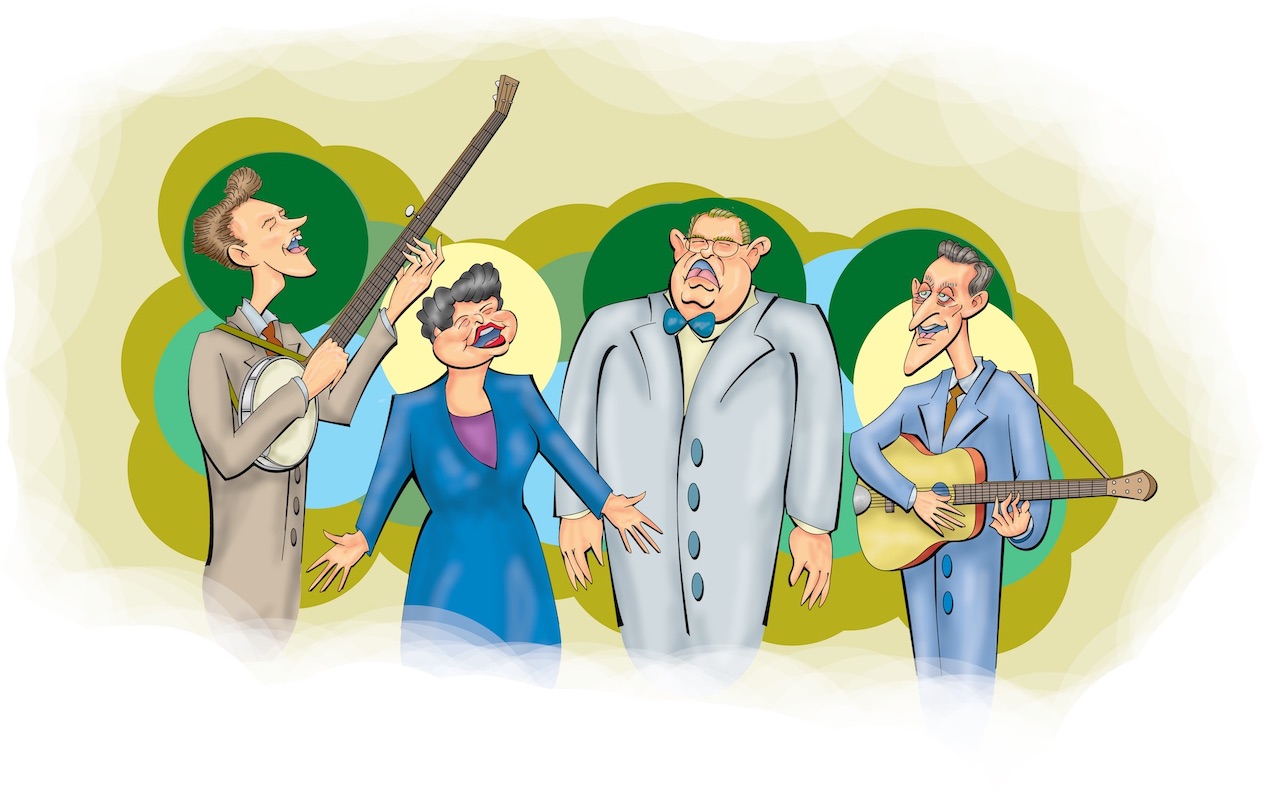
Pete and Ronnie and Lee and Fred
(Click to open an expandable
version in a new window.)
All right. Just why the hey did a folk group of singers and musicians call themselves The Weavers, for crying out loud? We'd really like to know that.
I thought you would as Captain Mephisto said to Sidney Brand. It's very simple really.
The name "The Weavers" was taken from a play Die Weber which means, yes, The Weavers. The play was by Gerhart Hauptmann, a German writer of the 19th and early 20th century. The plot involves an uprising of a group of weavers due to the harsh conditions in Germany at the dawn of the Industrial Revolution. Although the play is rarely (if ever) performed today, Gerhart won the Nobel Prize in Literature in 1912.
As how the name really fits the group beyond some loose association with workers' rights and helping to elevate the poor and downtrodden, the listeners are pretty much free to choose any interpretation. Perhaps you can say the group 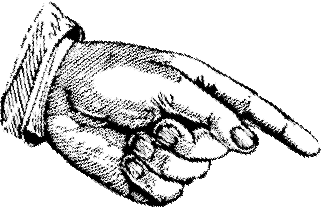 weaves a tapestry of songs together with a message for truth and humanity for the less fortunate in the world. Or something.
weaves a tapestry of songs together with a message for truth and humanity for the less fortunate in the world. Or something.
But why the name change is pretty straightforward. It was a redubbing of the No Name Quartet. That was a group of four musicians who in 1948 and almost by chance got together to accompany some dancers. They were Pete Seeger, Lee Hayes, Ronnie Gilbert, and Fred Hellerman. They briefly performed under the No-Name name and at Fred's suggestion switched to the Weavers.
Pete and Lee had known each other since the late 1930's. Lee had been born and raised in Arkansas. He became interested in folk music early, and some sources claim Lee's uncle was the well-known folklorist and long term resident of the Ozarks, Vance Randolph (the connection, though, is not well-documented). But Lee's dad was a Methodist minister and in later years Lee enjoyed doing the routine of a tongue-twisted preacher.
If any man deny the name of God, let him descend into the pittomless bot ... the bottomless bit ... the bottomless pot ... let him go straight to hell!1"
Footnote
Later Lee would play himself assuming the part of a preacher in the 1969 motion picture Alice's Restaurant.
Following some attempts at college and working at a number of jobs, Lee found himself at the Highlander Folk School in Tennessee. Always a good and strong bass singer, Lee then moved on to New York where he hooked up with members of the growing folk movement. That included Pete Seeger.
Pete was from a distinguished musical family. His dad, Charles, was a well known musicologist who had taught at Juilliard and Berkeley. Pete's mom, Constance, was a violinist, and she and Charles had an interest in folk music from around the world. Even though the marriage didn't last, Charles's second wife, Ruth was a classically trained composer and also studied indigenous music. She passed on her interest not only to Pete but to Pete's half-siblings, Mike and Peggy who both became performing professionals.
Pete attended Harvard but later dropped out. He got a job as an (unpaid) worker for Alan Lomax at the Library of Congress Folk Music Archives. Alan and his dad, John, had been pioneering folklorists, collecting folk songs from around the world. In 1933, they had recorded the singing of State Prisoner (and murderer) Huddle Ledbetter at the Louisiana State Prison in Angola. Mr. Ledbetter was soon paroled and appearing under his sobriquet Lead Belly,2 he became the driver and general factotum - and performer - on John's lecture tours.
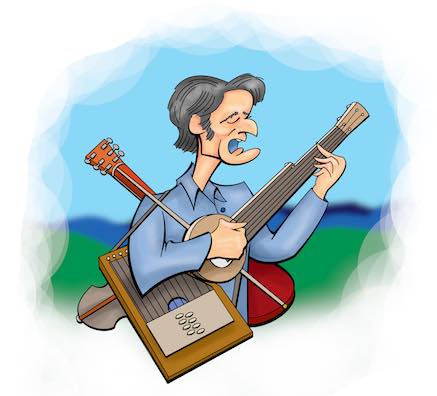
Mike
Pete's Brother
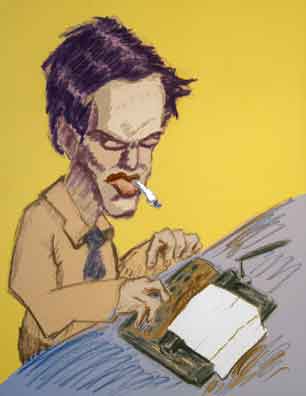
Alan
Pete's Boss
Footnote
The original spelling of Huddie's nickname was "Lead Belly" in two words. Later the practice became to spell it as one word, "Leadbelly". More recently, though, you'll see reversion back to two words.
The pronunciation of "Huddie" also seemed to have changed. In one of the early recordings made at Angola, Huddie pronounced it "HŬD-dee" where the "u" is short, as in "bud". But as early as 1950, people, including Leadbelly, began pronouncing it "HEW-dee".
Alan had encouraged Pete to learn the banjo saying Pete just looked like a banjo. So Pete got a list of old time players from the Archives and in 1940 hitchhiked through the Southeast to meet them and learn their technique. He learned rapidly and by the end of the year had become quite competent.
Pete, Lee, and whoever happened to be handy formed a singing group. They would play at parties, rallies, meetings, and just about anywhere else. When they were trying to come up with a name, someone pointed out that down-home folks had two books in their house, the Bible and The Farmers Almanac. The Bible was a guide for getting to the next life and the Almanac a guide for this life. So it was - with a bit of strained reasoning - The Almanac Singers.
Except for Pete, the group tended to be quite fluid in membership. For a while there was the now iconic Woody Guthrie as well as Agnes (Sis) Cunningham, Sis's husband, Gordon Friesen, Lee, and whoever else wanted to tag along. Later due to problems with Lee's drinking, he was replaced with Arthur Stern and every now and then one of Woody's friends in the merchant marine, Cisco Houston, might show up.
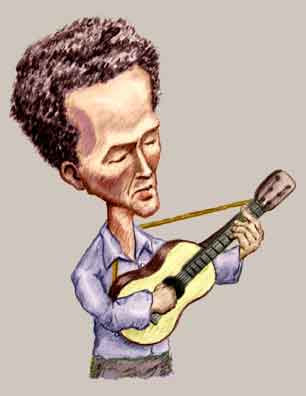
Woody
One of the Almanacs
The Almanac Singers were reasonably successful and issued a number of records on what later became the Folkways label. The singing - we must admit - was not quite as polished as expected of today's performers. Usually you had a good solo (particularly if Pete or Lee was singing) accompanied by a rather rough, raucous, and not always in tune chorus.
The high point of the Almanac Singers career was when they appeared on the patriotic radio program We the People and then later on This is War. The last show was intended to drum up support for the newly declared World War II and brought them a lot of attention.
A bit too much attention. The New York World Telegram promptly wrote an article about how the network had looked for some "hillbilly" performers and had inadvertently hired the favorite group of the Communist Party. Other papers jumped on the bandwagon and pointed out that the Almanacs had been vehemently against fighting Hitler until Japan launched their attack on Pearl Harbor. They had even taken some of their anti-war songs and switched them to be pro-war.
All chance of commercial success vanished. But with virtually all of the members soon ending up in the armed services, the group probably would have disbanded anyway.
After the war the question was what to do. Some of the bunch had recongregated in New York and continued more or less as before. They sang at hootenannies, at parties, and as the decade wound down, they enthusiastically supported the 1948 presidential campaign of Henry Wallace.
As part of the Wallace campaign, Pete organized the "Peoples Songs" - groups of musicians who would sing songs of solidarity for the working people. Among the Peoples Singers were two relative youngsters, Fred Hellerman and Ronnie Gilbert.
Fred had first met Pete and Lee at one of weekend get-togethers in the Almanac Singers' loft in Greenwich village which were called hootenannies3. He was only fourteen at the time and liked both the music and the bohemian atmosphere. But he was also a fan of pop music which at that time meant Benny Goodman, Tommy Dorsey, and Glenn Miller. He preferred to spend his time at the theaters where the bands were performing than in school.
Footnote
"Hootenanny" was first used in the current sense, according to Pete, in the 1930's to refer to a folk music gathering. However, the word is attested at least as early as 1907 to refer to what we would call a thing-a-ma-jig or a what-cha-ma-call-it. It's peak use corresponded with the television show Hootenanny in the 1960's and on which more will be said later. The word is still used fairly often today.
After the war Ronnie and Fred (who had been in the Coast Guard) worked as counselors at Camp Wo-Chi-Ca. This was a summer camp for kids whose parents had a leftist bent. Ronnie said she and Fred weren't very good camp counselors and were more interested in singing than in looking after the kids. Fred had a degree in English and was planning to go to graduate school in Chicago. But the Wallace campaign had galvanized the left and many plans were put on hold.
Henry had been the penultimate vice president for Franklin Roosevelt and had run on what was called the Progressive Ticket. Then as now, "progressive politics" is a term vague in meaning but high in connotation. As the years go by progressive politicians shift from the left to the right with élan, sometimes at the same time. After all, who can object to being "progressive"?
In Henry's time, though, the Progressive Party was actually a registered party and definitely leant to the left. In fact, Henry thought Franklin - even with his New Deal programs and expansion of executive powers - was too conservative. And it was Henry's somewhat crusading nature and his seeming approbation of the Soviet Union that prompted Franklin to drop Henry from the ticket and substitute the more down-to-earth Harry Truman.
Not to deny that Henry had his believers. He had been a popular vice president and now the Progressive Party expected to pull in at least 10,000,000 votes. Then with the imminent success of Progressivism, Henry's supporters believed all would be joy and jubilation, leaping and pleasure continually.
But what really mattered was what the average voter thought. To most Americans Henry's Campaign of the People with its platform of a national health program, nationalization of certain industries (including energy), and - gasp! - integration of the races - was nothing more than a thin disguise for the Communist Party.
What happened? It was only five years before that Life Magazine ran a whole issue praising the Soviet Union, its government, and its leaders. The issue sported a cover portrait of a grandfatherly and benign-looking Joseph Stalin, and told how the country was run by "loyal, capable administrators", had many photographs of happy, well-fed, smiling diverse Russian citizens, mentioned that Lenin was perhaps the "greatest man of modern times", and that regarding the lack of free speech in the Soviet Union, the proper attitude was "not to get too excited about it", and given what the USSR had accomplished, we can "make allowances for certain shortcomings"?
Why was Russia suddenly the boogeyman?
You see on March 5, 1946, Winston Churchill visited Westminster College in Missouri with President Harry Truman. There decked out in academic robes, Winston delivered his famous "Iron Curtain Speech". Suddenly, Uncle Joe Stalin, the benevolent patriarch of the happy contented Soviet family and who joined the fight against fascism for Peace and Freedom, was suddenly the murderous, bank-robbing, genocidal, and purveyor-of-the-purges, Iósif Vissariónovich Dzhugashvili. Far from being one of our strongest allies, the Russians were now the mortal enemies of Western Civilization.
In the end, Henry only grabbed about a million votes. As a final indignity, Henry pulled 10,000 less votes than Strom Thurmand. Strom, for those who don't remember him, was the "Dixiecrat" candidate and ardent segregationist. The Progressive Party collapsed and with it the Peoples Songs.
Pete and Lee were the few remnants of the Almanac Singers around. Sis and Gordon had left town and Woody Guthrie was beginning to show increasingly erratic behavior that many put down to alcoholism but was actually the emergence of the inherited and degenerative Huntington's Disease that ran in his family. Pete wondered if he should get a job in a factory.
But Ronnie and Fred were still around. So Pete asked his friend Max Gordon, who owned New York's Vanguard Night Club, if he'd be interested in having a folk quartet perform. Max figured, what the heck, he'd give it a try and soon the Weavers were packing them in.
One of those packed in was Howard Richmond. Howie was a music publicist and thought that the Weavers had real commercial potential. With Howie's encouragement Pete got hold of Harold Leventhal, an astute businessman who had been a staunch supporter of Henry. Harold agreed to serve as the group's manager. With the two H's handling the business end, the Weavers soon began cutting records.
But to appeal to the real masses - that is, the majority of Americans who actually bought records - Howie knew they needed a mainstream sound that was d'accord with the late 1940's popular tastes. That still meant big band music. Fortunately one of the Weaver's biggest fans was one of the most popular band leaders. That was Gordon Jenkins.
Lest the comments below seem overly-censorious about Gordon and his musical genre, Gordon - largely forgotten today - was one of the biggest names in popular music and his musicians were top notch. He was a regular visitor to the Vanguard, and after one performance he told Pete that their song "Tzena, Tzena, Tzena" was a sure hit.
"Tzena, Tzena, Tzena" was a popular Israeli tune by Yechiel Chagiz and Yisachar Meron. The Weavers' pronunciation of the Hebrew was pretty good said one expert, but someone (it's not clear who - possibly Gordon) now freely translated the words into English. And we mean freely. The change, though, was probably dictated by the mores of the times. So instead of the original:
Go out, go out, go out, girls
And see soldiers in the moshavah4.
Do not, do not, do not hide yourself
Away from a soldier, an army man.
Footnote
A moshav (מוֹשָׁב, pronounced moe-SHAV) is an agricultural settlement. In a moshav the farmers live in a central village, but owned their own fields.
Contrasted to the moshav was the kibbutz (קִבּוּץ). Organized along the lines of strict socialism, settlers on a kibbutz held their land collectively. All money earned was pooled for the community.
... the Weavers sang:
Tzena! Tzena! Tzena! Tzena!
Can't you hear the music playing
In the city square?
Tzena! Tzena! Tzena! Tzena!
Come where all our friends will find us
With the dancers there!
"Tzena" itself means to come out, come together, flock, congregate, and such. But the nonversant tend to interpret it as a proper feminine name. The idea of young ladies in a bunch seeking out the young soldiers was a bit too much for those prudish and increasingly non-militaristic times. Hence the loose translation.
Gordon brought not only his full brass sections and pizzicato violins to "Tzena, Tzena, Tzena", he also brought name recognition. Labeled as from "Gordon Jenkins and his Orchestra with the Weavers" it was more a "novelty" song than folk. Fortunately, the singing of Pete, Ronnie, Lee, and Fred was what really carried the day and "Tzena, Tzena, Tzena" became a Top 10 hit. The record even jump-started the song's popularity in Israel when it was later recorded by an Israeli singer who more or less adapted the Weavers/Gordon Jenkins arrangement.
The Weavers sounded far more professional than the Almanac Singers. Everyone could take a solo when needed but they also harmonized particularly well. Although it's common - and correct - to see Pete as the leader of the group, Ronnie was the lead singer. On virtually every song she carries the melody and despite the 3:1 male:distaff ratio, her voice stands out most clearly. You wonder if without Ronnie the group would have been the hit it was.
There's a bit of confusion as to what was the flip side of "Tzena, Tzena, Tzena". One list mentions it was "Around the World" where the group takes the listener on a world tour of folk music.
But most often you read the other side was "Goodnight Irene". This was a mildly sanitized version of "Irene" which was Leadbelly's theme song. Huddie himself sang it at the beginning and the end of his last concert in Austin, Texas, on June 15, 1949, and in front of what was from the sound of it a pretty good size crowd.
Today Leadbelly's version would raise no eyebrows. But this was 1950. So instead of Leadbelly's line:
I gets you in my dream.
... we hear:
I'll see you in my dream.
And the Weavers also sing:
Sometimes I get a great notion
To jump in the river and drown.
... but left out Leadbelly's final verse:
If Irene turns her back on me
I'm going to take morphine and die.
"Goodnight Irene" became the #1 hit of 1950. And yes, the recording had Gordon's orchestra and chorus which - particularly on "Irene" - sounds horribly treacly. Fortunately on later recordings and concerts, the Weavers sang the song with just the four of them. Most of their later records and albums were just Pete, Ronnie, Lee, and Fred. Still from 1948 to 1952 if you got the Weavers you also got Gordon and his bunch (including some whistlers) which in 1952 gave us one of their less credible songs, "Around the Corner" or "Beneath the Berry Tree".
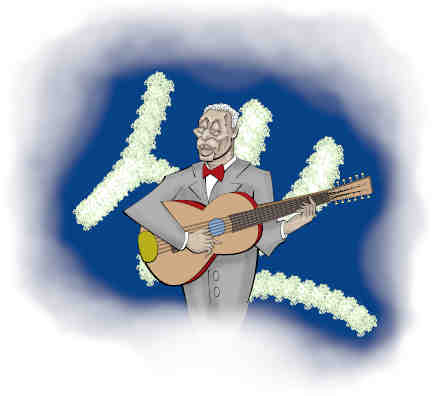
Leadbelly
A Hit
The Weavers were the first really successful folk group which at that early date was lumped in with what we now call Country and Western5. They played to sold out concerts and even appeared in a series of short films played in movie theaters. The only thing that strikes the modern viewer as odd is seeing the quartet formally decked out in business suits complete with white shirts and ties and Ronnie in a formal black dress. It wasn't until the bohemian beatniks transformed into the 1960's hippies that the slovenly - sorry, that's casual look - became de rigueur for popular performers.
Footnote
Before 1950, country music - often called "hillbilly" - was classified together with folk music on the Billboard charts. So you can argue that groups like the Carter Family - A. P., Sarah, and Maybelle - were successful "folk" groups. But they were not folk groups in the sense that developed later.
On the other hand it was in 1949, the year before the Weavers had their hit with "Irene", that Country and Western was defined as a musical category. On June 18, 1949, "Lovesick Blues" by Hank Williams reached the #2 spot and it was listed in Billboard as a "folk" song. But a week later - July 26, 1949 - "Love Sick Blues" reached the top spot. The magazine also retitled the list. Although it was still part of the "folk" category, in parentheses was the new sub-genre, Country and Western. So by the time "Irene" reached #1, folk and country music had gone their separate ways.
Sadly the Weavers fell victim to the times. Winston's warnings of the Iron Curtain led to the rise of Senator Non-Tailgunner Joe McCarthy who immediately began to - quote - "investigate" - unquote - infiltration of the government by Soviet agents and their sympathizers.
Anyone with any association, real or imaginary, with leftist politics became a suspected Communist (with a capital "C"). Included in the list of "suspects" were Harry Belafonte (popular singer and civil rights activists), Howard K. Smith (ABC broadcaster who gave thoughtful and yet fairly conservative editorials), Orson Bean (comedian and panelist on celebrity quiz programs), Lena Horne (great singer and all around lady), Alan Lomax, Yip Harburg (writer of the lyrics of many songs including Somewhere Over the Rainbow), Arthur Miller (playwright and author of The Crucible and once the husband of Marylin Monroe), Charles Chaplin (master comic of the silent era and later), Orson Wells (who directed and starred in Citizen Kane and as an actor had a guest appearance in the Muppet Movie), Robert Shayne (who played Inspector Henderson on the TV series, the Adventures of Superman), Howard Fast (author of the novel Spartacus which was later made into the movie starring Kirk Douglas and who penned The Crossing about George Washington), Gypsy Rose Lee (among other things the most famous ecdysiast in history), Oscar Brand (friend of Pete and whose album Presidential Campaign Songs is a classic), Peter Viertel (screenwriter who wrote The African Queen), José Ferrer (movie actor whose most famous roles were Iago and Toulouse-Lautrec), Aaron Copland (American composer of "Fanfare for the Common Man", "Appalachian Spring", "Rodeo", and "Billy the Kid"), Richard Attenborough (British actor who starred in The Great Escape), Professor Irwin Corey (yes, even he was blacklisted), Eddie Albert (Burl Ives' old friend and who later starred with Eva Gabor on Green Acres), Ossie Davis (famous actor who appeared in many movies including Bubba-Ho-Tep and Nat Turner: A Troublesome Property), Martin Gabel (Tony Award winning stage actor and husband of Arlene Francis), Zero Mostel (creator of the role of Tevye in Fiddler on the Roof and who played Max Bialystock in The Producers with Gene Wilder), Josh White (master bluesman whose "The House I Live In" sounds amazingly patriotic), Will Geer (who played the grandfather on The Waltons), Leonard Bernstein (yes, we mean Lenny), Langston Hughes (famous black author who wrote poetry that actually rhymes and has meter), Ruby Dee (star with Sidney Poitier in Raisin in the Sun), Artie Shaw (oft-times married clarinetist and Big Band leader), and Jeff Corey (highly prolific actor with more roles than we can list as well as an acting teacher who coached Leonard Nimoy).
Pete's Friends
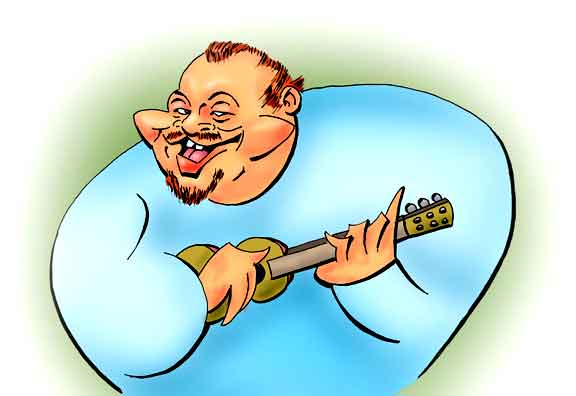
Burl Ives
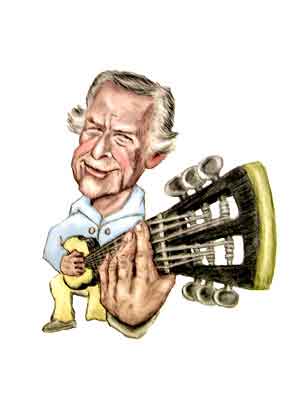
Oscar Brand
Oh, yes. And Pete and Fred and Ronnie and Lee.
With their undeniably left-wing association, the Weavers were immediately suspected of disloyalty and subversiveness6. Record companies became lukewarm - Gordon Jenkins and his Orchestra or not - and concerts became harder to book. It looked like the first commercially successful folk phenomenon was going to be over almost as soon as it had begun.
Footnote
As an example of how crazy the times were, one of the reasons Pete was suspected of disloyalty was he had received letters on paper with the header of the Japanese-American Committee for Democracy. Of course, the letters were from Pete's then girl-friend (and later his wife), Toshi Ohta. Toshi was a native born American (although actually born in Germany) and her dad was working for the United States Army
On August 16, 1955, Lee Hays was summoned to appear before the House Committee of Un-American Activities (dubbed HUAC and pronounced "hoo-ACK"), a Congressional committee which was without doubt the most un-American activity ever officially assembled on American soil. When asked about his past associations and political beliefs, Lee pled the Fifth Amendment, which meant he believed his answers might be self-incriminatory and so he was legally allowed to refuse to answer.
Two days later Pete appeared before HUAC. Refusing to plead the Fifth Amendment - he didn't think anything he had done was wrong - he nevertheless refused to answer questions about his personal beliefs and associations, saying such questions were improper to be put to an American citizen. Pete was, in effect, pleading the First Amendment.
Pete was slapped with 10 counts of contempt of Congress. But he wasn't brought to trial for some years. He continued to perform where he could, often on college campuses.
Finally in 1961 he was found guilty on all counts and received 10 years. The sentence, though, was in 1 years chunks that were to be served concurrently. He remained free pending appeal and a year later, in 1962, an appeals court threw the case out on a technicality. The prosecutors decided to let the case drop. Pete was a free man.
By this time folk music had really taken off. In 1958 the Kingston Trio had a surprise #1 hit with "Tom Dooley". TV specials abounded (one special was hosted by Cisco Houston) and finally there was even a television series devoted to folk music. This was Hootenanny which aired on ABC from 1963 to 1964.
Pete was never on Hootenanny and the rumors were the network bigwigs had secretly blacklisted him from the airways. Some of his friends refused to appear although Pete encouraged them to do so. Fred, Lee, and Ronnie never appeared either.
All right. Were the Weavers communists?
A word, of course and as Humpty Dumpty said, means what we want it to mean, no more and no less. If we mean a card-carrying member of CP-USA, the answer is yes and no.
Lee and Ronnie, as as far as we know, where not party members. On the other hand, both Pete and Fred had been members of the Young Communist League. But by 1949, both had ceased official contact with the party although they didn't sever friendships with people just because they were CP members.
Today, though, in our hard-arsed culture where what someone did or said as an immature 15 year old is cited by their political opponents as a disqualification for public service, it's become quite popular to trash Pete as a Stalinist sympathizer. Pete himself acknowledged that he should have been more severe in his criticism of the Soviet's denial of free speech and individual liberties - not to mention the Gulag7. But that had nothing to do with where someone was or wasn't a communist or socialist or progressive or Democrat or Republican. As Pete put it when he was in his seventies:
I still call myself a communist, because communism is no more what Russia made of it than Christianity is what the churches make of it. But if by some freak of history communism had caught up with this country, I would have been one of the first people thrown in jail."
Footnote
That the United States had the equivalent of the Gulag is something that is rarely taught in American history classes, certainly not today. In the late 19th and early 20th century, some prisons in the United States could honestly be labeled as the most brutal in the world. This is particularly true of the southern penitentiaries where by far the worst conditions were on the state farms and at the convict mines.
The prison farms and mines were designed to both produce a revenue for the state and turn a profit. To do this the state governments kept alive the institution of slavery long after its statutory abolition. There was also a system of convict leasing where convicts were hired out for work in private farms, businesses, and for county and state departments. Naturally the private firms made sure they minimized the cost (clothes, food, facilities) and maximized productivity (quotas, hours worked). After disappearing for a time in the early and middle twentieth century, today convict leasing has returned with a vengeance and is a now a way for businesses to complete with cheap foreign labor. The consumer might be surprised to find out how many items in their own homes are produced by convicts whose work is leased to companies who outbid firms employing law abiding citizens.
If the prison farms were bad enough, the convict mines were far worse and created scenes that, as Alan Lomax (who saw many southern prisons firsthand) correctly pointed out, rivaled those of the Arbeitslager Nazi concentration camps. Again we must point out that Americans do not teach this part of history to their kids.
It would not be correct to state that it was only the prisons housing black inmates - at that time prisons were segregated - that were brutal. As Clyde Barrow - of "Bonnie and Clyde" fame - found out, it was no summer camp on the prison farm he found himself. His decision never to be taken alive was motivated by the horrible conditions he had endured.
For what it's worth, Pete's name is also found on lists of Unitarian Universalists.
The Weavers continued to play during these hard times. In 1955 they performed at Carnegie Hall to a sold out crowd. Later and reportedly in a disagreement about performing for a cigarette ad, Pete left the group in the 1960's and Erik Darling stood in at the banjo.
Finally Pete made it back on television. He hosted a television program Rainbow Quest from 1965 to 1966. The shows were taped in New York City and had limited circulation. However when videos became available, they were reissued for the home and remain among the best programs of folk music ever made.
Pete famously appeared on the Smothers Brothers Comedy Hour where his anti-war song "Waist Deep in the Big Muddy" was cut without either his or Tom and Dick's knowledge or consent. Later he was invited back and sang the song.
But the Good Stamp of American Approval really arrived when Pete appeared on - get this - The Johnny Cash Show. That was in 1970. He sang two songs and Johnny joined in.
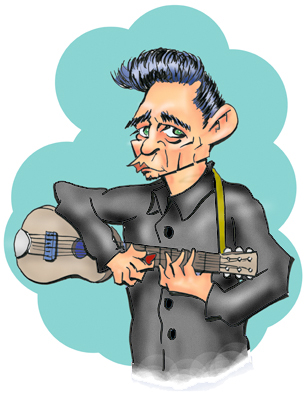
Johnny
Pete's GOOD Friend
The Weavers met for a final concert in 1980. By then Lee was in a wheelchair and his bass voice had lost much of its boom. But Pete, Fred, and Ronnie sounded as good as ever. Sadly none of the Weavers are left but you can still find their records pretty much everywhere. Yes, even the records of "Gordon Jenkins and His Orchestra with the Weavers".
References and Further Reading
Wasn't That a Time: The Weavers, the Blacklist, and the Battle for the Soul of America, Jesse Jarnow, Hachette Books, 2018.
How Can I Keep from Singing: Pete Seeger, David King Dunaway, McGraw-Hill, 1981.
Special Issue: USSR, Life Magazine, March 29, 1943.
"The Weavers", Discography of American Historical Recordings.
"Remembering Pete And The 'Secret History' of 'Tzena Tzena.'", Jeffrey Salkin, Jewish Week, February 3, 2014.
"The Tsanah Period", Tom Segev, Ha-Aretz, December 5, 2011.
"The Day Pete Seeger Faced Down the HUAC As Though, Well, He Had a Hammer", Scott Martell, January 29, 2014, The Los Angeles Times,
"The Old Left", The New York Times Magazine, January 22, 1995.
"Uncommon Man: The Strange Life of Henry Wallace, the New Deal Visionary", Alex Ross, October 7, 2013.
"Fred Hellerman, Folk Singer and Songwriter", The Telegraph, September 4, 2016.
"The Embattled Lee Hays", Jeff Sharlet, Oxford Times, Issue 58, 2007.
"Activist Lee Hays Wove Musical Fabric", Stephen Koch, Arkansas Times, July 21, 20061
The Egyptian, Mika Waltari, Naomi Walford (Translator), Putnam, 1949.
The Weavers 1949-1952: Goodnight Irene, Bear Records.
"The Johnny Cash Show", Johnny Cash (Host), Pete Seeger (Guest), March 4, 1970, Internet Movie Data Base.
"The Smothers Brothers Comedy Hour", Tom Smothers (Host), Dick Mothers (Host), Pete Seeger (Guest), March 3, 1968, Internet Movie Data Base.
"The Smothers Brothers Comedy Hour", Tom Smothers (Host), Dick Smothers (Host), Pete Seeger (Guest), September 10, 1967, Internet Movie Data Base.
"Hootenanny", Ngram Viewer.
Sim Greene and Tom the Tinker's Men: A Narrative of the Whiskey Insurrection Being a Setting Forth of the Memoirs of the Late David Froman, Esq., Richard Taylor Wiley, John Winston Company, 1907.